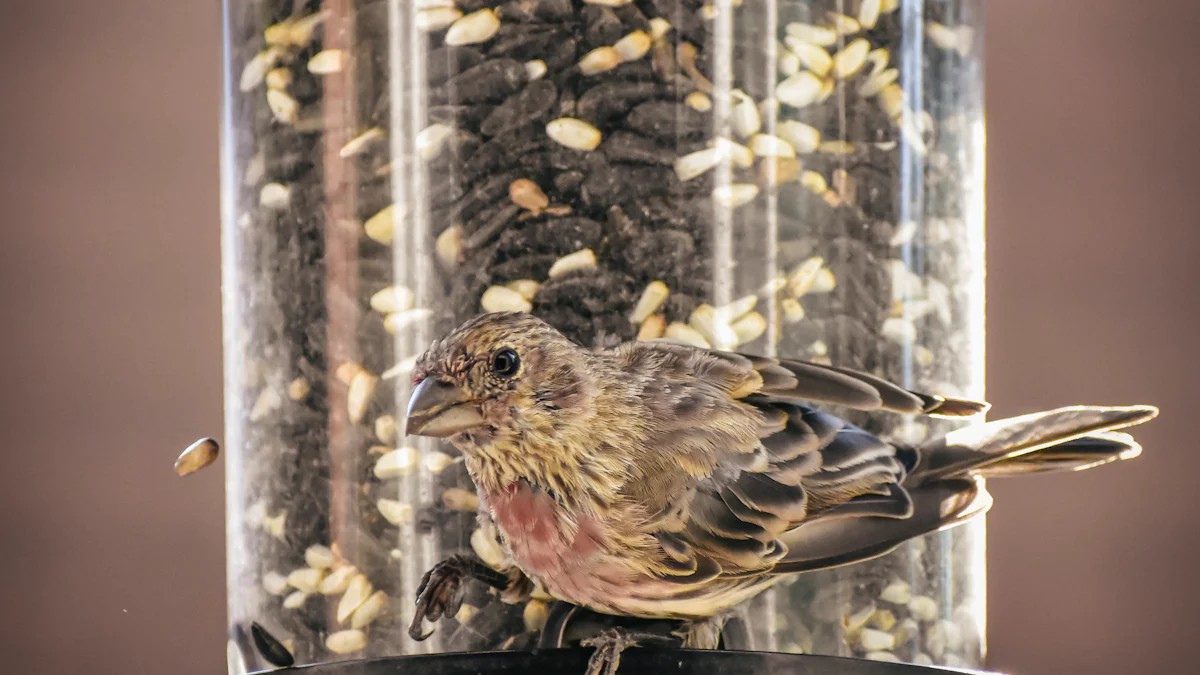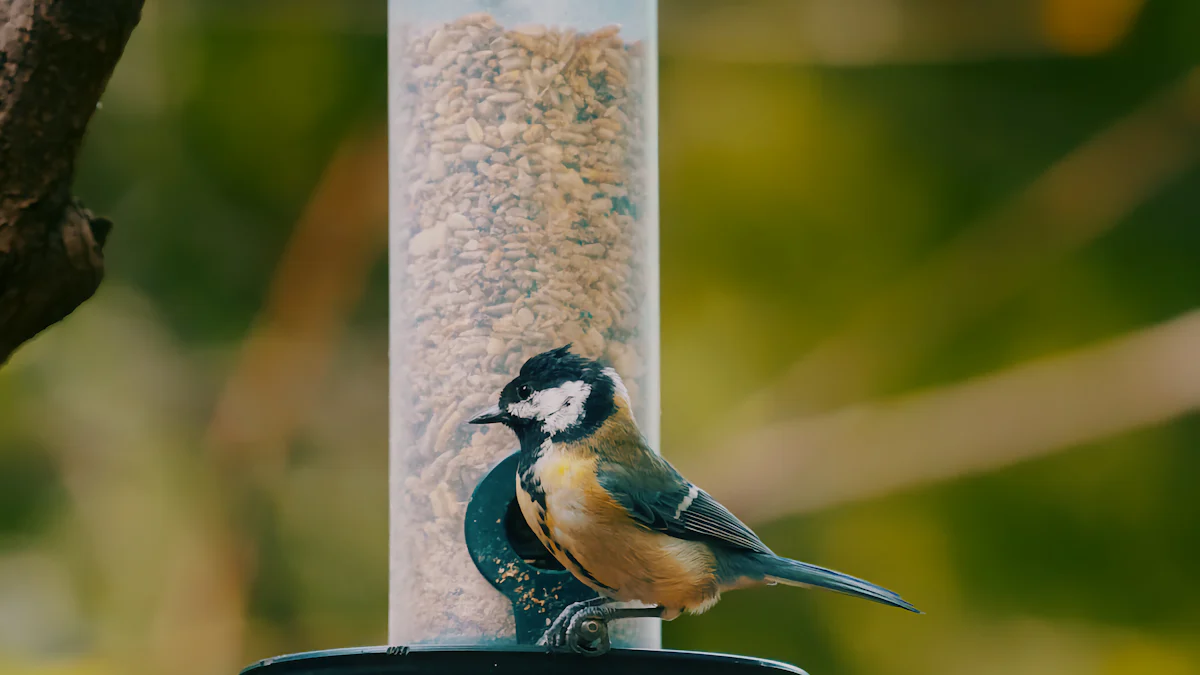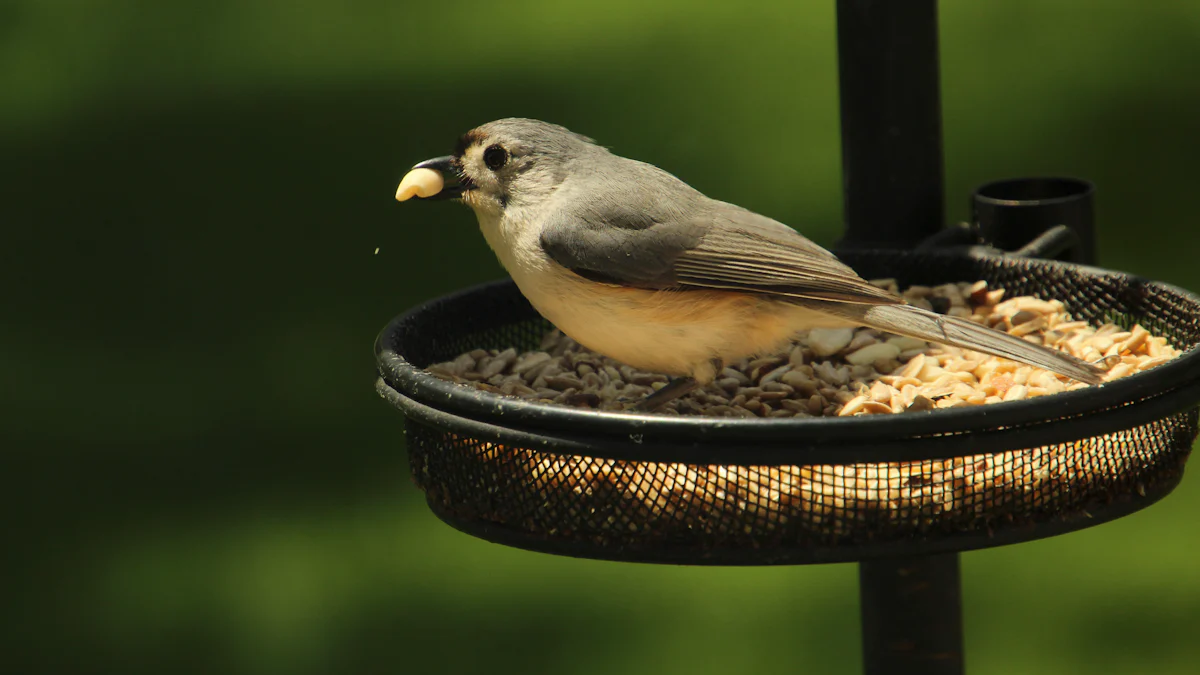
Imagine transforming your backyard into a vibrant haven for wild birds. Calci Worms For Wild Birds make this possible by offering a nutrient-packed feast that birds simply can’t resist. These tiny larvae, rich in calcium and protein, provide essential support for bone strength, feather health, and egg production. With up to 50 times more calcium than dried mealworms, they ensure birds stay strong and energetic. Plus, their natural appeal attracts species like robins, sparrows, and woodpeckers, turning your garden into a lively birdwatching paradise.
Key Takeaways
- Calci Worms are a nutrient-rich food source for wild birds, offering up to 50 times more calcium than dried mealworms, essential for bone health and egg production.
- These tiny larvae attract a variety of bird species, including robins, sparrows, and woodpeckers, transforming your backyard into a lively birdwatching paradise.
- Feeding Calci Worms supports overall bird health by providing protein and energy-rich fats, helping birds stay active and resilient throughout the year.
- Calci Worms can be easily integrated into your bird feeding routine by mixing them with traditional seeds or scattering them on bird tables.
- Proper storage and handling of Calci Worms ensure they remain fresh and appealing, enhancing the feeding experience for your feathered friends.
- Introducing Calci Worms gradually can help hesitant birds adapt, ensuring they enjoy this nutritious treat and keep returning to your feeding station.
What Are Calci Worms For Wild Birds?
Understanding Calci Worms
Calci Worms, also known as black soldier fly larvae, are a game-changer in the world of bird feeding. These tiny, nutrient-packed morsels are a natural food source that closely resembles what wild birds eat in their natural habitats. Unlike other bird food options, Calci Worms provide a perfect balance of essential nutrients, making them a favorite among insect-eating and omnivorous birds.
When you offer Calci Worms, you’re not just feeding birds; you’re inviting a diverse range of species to your backyard. Birds like robins, sparrows, bluebirds, and woodpeckers can’t resist these tasty treats. Their wriggly appearance and high nutritional value make them irresistible to feathered visitors. Whether scattered on a bird table or placed in a feeder, Calci Worms create a feast that keeps birds coming back for more.
Nutritional Profile of Calci Worms
Calci Worms are a powerhouse of nutrition. They boast an impressive calcium content—up to 50 times more than dried mealworms. This high calcium level is crucial for birds, especially during breeding seasons when they need strong bones and healthy eggs. By feeding Calci Worms, you ensure that birds get the calcium they need to thrive.
But that’s not all. Calci Worms are also rich in protein, which fuels birds with the energy they need for daily activities like flying, foraging, and caring for their young. The protein content supports muscle growth and feather health, keeping birds vibrant and active. Additionally, these worms contain energy-giving fats, making them an excellent choice during colder months when birds require extra calories to stay warm.
What sets Calci Worms apart is their balanced phosphorus-to-calcium ratio. This balance ensures that birds can absorb and utilize the calcium effectively, promoting overall health without any dietary imbalances. When mixed with traditional birdseed or served alone, Calci Worms provide a well-rounded diet that supports the well-being of your feathered friends.
“Calci Worms are not just food; they’re a lifeline for wild birds, offering unmatched nutritional benefits that help them thrive year-round.”
Benefits of Calci Worms For Wild Birds

Supporting Bone Health and Egg Production
Strong bones and healthy eggs are vital for wild birds, especially during breeding seasons. Calci Worms For Wild Birds provide an exceptional source of calcium, which plays a key role in bone development and egg formation. Birds need calcium to maintain skeletal strength and produce eggs with sturdy shells. Without enough calcium, birds may struggle with brittle bones or weak eggs that fail to hatch.
What makes Calci Worms stand out is their perfectly balanced calcium-to-phosphorus ratio. This balance ensures that birds can absorb calcium efficiently, promoting optimal bone health. During nesting periods, female birds rely heavily on calcium reserves to lay eggs. By offering Calci Worms, you help them replenish these reserves and support the next generation of feathered friends.
“Calci Worms are like a superfood for wild birds, delivering the calcium boost they need to thrive.”
Attracting a Variety of Bird Species
Want to turn your backyard into a birdwatcher’s dream? Calci Worms For Wild Birds act as a magnet for a diverse range of species. Their natural appeal and high nutritional value make them irresistible to insect-eating and omnivorous birds. Robins, bluebirds, sparrows, and woodpeckers are just a few of the feathered visitors you can expect to see.
Unlike traditional birdseed, Calci Worms mimic the insects birds naturally forage for in the wild. This makes them a familiar and enticing food source. When you scatter Calci Worms on a bird table or place them in a feeder, you create an open invitation for birds to flock to your garden. The more species you attract, the more vibrant and lively your outdoor space becomes.
“With Calci Worms, your backyard transforms into a bustling hub of bird activity.”
Promoting Overall Health and Energy
Wild birds face countless challenges daily, from finding food to evading predators. To meet these demands, they need a diet rich in energy and nutrients. Calci Worms For Wild Birds deliver exactly that. Packed with protein, calcium, and energy-giving fats, these tiny larvae fuel birds with the stamina they need to soar through their busy lives.
Protein supports muscle growth and feather health, ensuring birds stay strong and agile. Calcium strengthens their bones and eggs, while fats provide the extra calories needed during colder months. By feeding Calci Worms, you give birds the tools to maintain their vitality and resilience year-round.
“Think of Calci Worms as a power-packed snack that keeps wild birds energized and thriving.”
Calci Worms For Wild Birds vs. Other Bird Food Options
Calci Worms vs. Mealworms
When comparing Calci Worms to mealworms, the nutritional differences stand out immediately. Calci Worms pack a punch with up to 50 times more calcium than dried mealworms. This calcium boost is essential for wild birds, especially during breeding seasons when strong bones and sturdy eggshells are critical. Mealworms, while popular, simply can’t compete with this level of nutritional value.
Calci Worms also offer a perfectly balanced phosphorus-to-calcium ratio. This balance ensures that birds can absorb and utilize calcium effectively, promoting better bone health and feather strength. Mealworms, on the other hand, lack this balance, which may limit their benefits for your feathered visitors.
In terms of energy, Calci Worms shine again. They contain higher levels of fat and protein, providing birds with the stamina they need to thrive. Whether it’s fueling their flight or helping them stay warm during colder months, Calci Worms deliver. Mealworms, though rich in protein, fall short in offering the same energy-packed benefits.
“Think of Calci Worms as the premium upgrade to mealworms—more calcium, more energy, and more benefits for your backyard birds.”
Comparing Calci Worms to Seeds and Suet
Seeds and suet have long been staples in bird feeding, but how do they measure up to Calci Worms? While seeds provide a good source of energy and suet offers high-fat content, neither comes close to the comprehensive nutrition found in Calci Worms. These tiny larvae mimic the natural diet of wild birds, making them a more instinctive and appealing food choice.
Calci Worms excel in their calcium content, which seeds and suet lack. Calcium plays a vital role in bone development, egg production, and overall health. By offering Calci Worms, you provide a nutrient that seeds and suet simply can’t deliver. This makes them an invaluable addition to your bird-feeding routine.
Another advantage of Calci Worms is their protein content. While seeds focus on carbohydrates and suet on fats, Calci Worms strike a balance with high protein levels. This supports muscle growth, feather health, and energy needs, ensuring birds stay active and vibrant.
“Seeds and suet may be the classics, but Calci Worms are the game-changer your backyard birds will thank you for.”
Practical Tips for Feeding Calci Worms For Wild Birds

How to Offer Calci Worms
Serving Calci Worms to your feathered friends is as simple as it is rewarding. You can place them in a variety of feeders, such as tray feeders or specialized insect feeders. If you prefer a more natural approach, scatter them on bird tables or directly on the ground. Birds love foraging, and this mimics their natural feeding behavior.
For an extra treat, mix Calci Worms with other bird foods like seeds or suet. This combination not only enhances the nutritional variety but also entices birds that might be hesitant to try something new. Their small size makes them easy to digest, which is especially beneficial for fledglings and adult birds alike.
During colder months, when food is scarce, Calci Worms provide the energy boost birds need to stay warm. In spring, their high calcium content supports egg production and chick development. Offering them year-round ensures your backyard becomes a reliable haven for wild birds.
Pro Tip: Place Calci Worms in a visible spot to catch the attention of passing birds. Once they discover this tasty snack, they’ll keep coming back for more!
Encouraging Birds to Try Calci Worms
If your backyard birds seem hesitant, don’t worry—wild birds can be cautious about new food. Start by mixing Calci Worms with their usual feed. This gradual introduction helps them associate the worms with familiar tastes. Over time, you can increase the proportion of Calci Worms until they’re comfortable eating them on their own.
Positioning matters too. Place the worms in areas where birds already gather, such as near existing feeders or water sources. Birds feel safer in familiar spots, making them more likely to try new food. You can also sprinkle a few worms on the ground to mimic the natural foraging experience.
Patience is key. Birds may take a few days to warm up to Calci Worms, but once they do, you’ll notice an increase in activity around your feeding station. The high protein and calcium content will keep them coming back, ensuring your backyard remains a lively hub of chirping and fluttering.
Fun Fact: Birds like robins and bluebirds are particularly fond of Calci Worms. Keep an eye out for these colorful visitors as they discover your new offering!
Storing and Handling Calci Worms For Wild Birds
Proper storage and handling of Calci Worms ensure they remain fresh, nutritious, and ready to delight your feathered visitors. By following a few simple steps, you can maintain their quality and make feeding wild birds a seamless experience.
Proper Storage Techniques
Keeping Calci Worms fresh starts with choosing the right storage spot. A cool, dry location works best. Avoid areas exposed to direct sunlight or high humidity, as these conditions can degrade the worms’ texture and nutritional value. Think of places like a pantry or a shaded cabinet for optimal storage.
For added protection, transfer the worms into an airtight container or resealable bag. This step prevents moisture from sneaking in and keeps pests away. Airtight storage also locks in freshness, ensuring the worms stay appealing to birds. If you’re using a feeder, check it regularly to ensure the worms remain fresh and replace any that appear stale.
Pro Tip: Label your container with the purchase date to keep track of freshness. This way, you’ll always know when it’s time to restock.
Handling Tips for Calci Worms
Handling Calci Worms doesn’t have to be messy or complicated. When preparing to feed them, consider soaking the dried worms in warm water for about 30 minutes. This rehydrates them, adding extra moisture that wild birds will appreciate, especially during warmer months when hydration is crucial.
When placing the worms in feeders, use specialized worm feeders or trays for easy access. If you prefer a more natural approach, scatter a handful on the ground to mimic the foraging experience birds enjoy. Always clean your feeders periodically to maintain hygiene and prevent the buildup of bacteria or mold.
Fun Fact: Birds like robins and bluebirds are particularly drawn to hydrated Calci Worms. Watch for these colorful visitors as they flock to your backyard buffet!
By storing and handling Calci Worms properly, you ensure they remain a top-quality treat for wild birds. These small efforts go a long way in creating a welcoming and nourishing environment for your feathered friends.
Calci Worms For Wild Birds offer an exceptional way to nourish and support your feathered visitors. Their high calcium content strengthens bones and ensures healthy egg production, while the protein and energy-rich fats keep birds active and vibrant. By adding these nutrient-packed treats to your feeding routine, you create a thriving haven for wild birds in every season. Whether it’s winter energy or springtime calcium, Calci Worms deliver unmatched benefits. Start feeding them today and watch your backyard transform into a lively sanctuary filled with chirping, fluttering joy.
FAQ
What are Calci Worms?
Calci Worms are the larvae of black soldier flies, packed with nutrients that wild birds love. These tiny powerhouses come from China, where they are raised on a wholesome diet of wheat meal, pumpkin seeds, and bran. Their natural composition makes them a perfect addition to your bird-feeding routine.
How do Calci Worms compare to dried mealworms?
Calci Worms outshine dried mealworms in nutritional value. They contain 20 to 40 times more calcium, which is crucial for bone strength, feather health, and egg production. While mealworms are rich in protein, Calci Worms take it a step further by offering a balanced mix of proteins and calcium, making them a superior choice for your feathered friends.
Fun Fact: Birds need calcium not just for strong bones but also for producing eggs with sturdy shells. Calci Worms deliver this essential nutrient in abundance!
Can I feed Calci Worms to all bird species?
Yes, most insect-eating and omnivorous birds enjoy Calci Worms. Species like robins, bluebirds, sparrows, and woodpeckers find them irresistible. Their natural appeal mimics the insects birds forage for in the wild, making them a hit with a wide variety of feathered visitors.
How should I serve Calci Worms to wild birds?
You can offer Calci Worms in tray feeders, insect feeders, or even scatter them on the ground. Mixing them with seeds or suet can entice birds that are hesitant to try something new. For an extra treat, soak the dried worms in warm water to rehydrate them, adding moisture that birds will appreciate.
Are Calci Worms suitable for year-round feeding?
Absolutely! Calci Worms provide benefits in every season. During winter, their fats and proteins give birds the energy to stay warm. In spring, their high calcium content supports egg production and chick development. Feeding them year-round ensures your backyard remains a reliable haven for wild birds.
How do I store Calci Worms to keep them fresh?
Store Calci Worms in a cool, dry place, away from direct sunlight and humidity. Use an airtight container or resealable bag to lock in freshness and keep pests out. Label the container with the purchase date to track their shelf life. Proper storage ensures the worms stay appealing and nutritious for your feathered visitors.
Why are Calci Worms better than seeds or suet?
Seeds and suet are great, but they lack the calcium and protein punch that Calci Worms deliver. While seeds focus on carbohydrates and suet on fats, Calci Worms provide a balanced mix of nutrients. They mimic the natural diet of wild birds, making them a more instinctive and beneficial food choice.
Pro Tip: Combine Calci Worms with seeds or suet to create a well-rounded feast that birds can’t resist!
How long does it take for birds to start eating Calci Worms?
Birds may take a few days to get used to Calci Worms. Start by mixing them with their usual feed to make the transition easier. Place the worms in familiar spots, like near existing feeders or water sources. Once birds discover the worms, they’ll keep coming back for more.
Are Calci Worms safe for baby birds?
Yes, Calci Worms are safe and beneficial for fledglings. Their small size and high calcium content make them easy to digest and perfect for growing birds. By feeding Calci Worms, you support the health and development of the next generation of wild birds.
Do Calci Worms attract pests?
When stored properly in airtight containers, Calci Worms won’t attract pests. Regularly clean your feeders and replace any stale worms to maintain hygiene. Following these steps ensures a pest-free and enjoyable feeding experience for both you and your feathered visitors.


